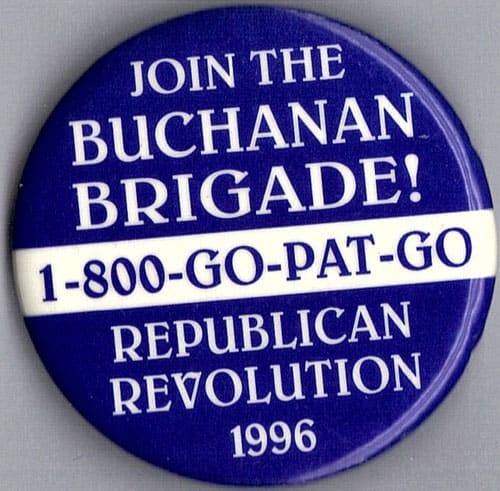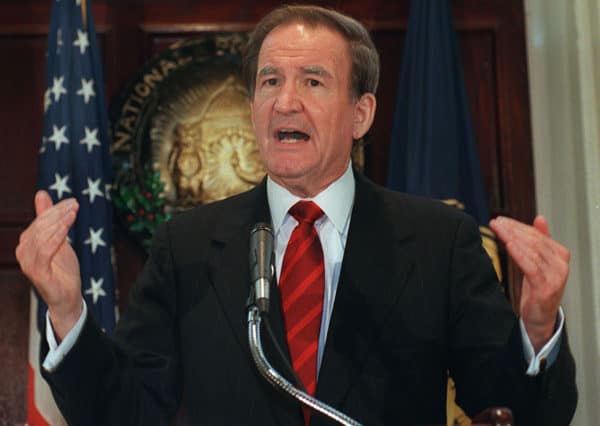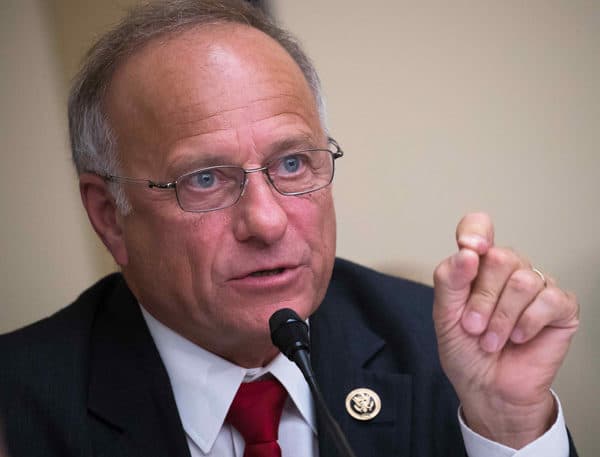Fighting in the Trenches
Ian Jobling, American Renaissance, January 2005

The annual conference of Patrick J. Buchanan’s The American Cause took place in Tyson’s Corner, Virginia, on December 4. It was called “Preserving a Nation: The Battle to Secure America’s Border,” and the speakers included many of America’s foremost restrictionist politicians, activists, and intellectuals. There was a good audience of about 200, including many young people.
The main subject was illegal immigration, rather than immigration as a whole, and there was little discussion of reforming legal immigration. Some presentations addressed theoretical questions raised by mass immigration, but most were about politics and practical matters. Speakers objected to immigration mainly because it is a threat to cultural continuity, national sovereignty, the rule of law, and the economy, not because it brings racial conflict and displaces whites. Still, many presentations had strong racial undertones.
The first panel was about Balkanization, and opened with a talk by Patrick Buchanan. He said activists must face the “intimidating myth” that America is a nation of immigrants, which makes it easy to paint reformers as anti-American bigots. As liberals see it, “Inside every conservative, there’s a tiny Klansman trying to get out. In my case, a very large Klansman!” In fact, though, we are not a nation of immigrants: Half of us can trace our roots back to the revolution, and only 12 percent of Americans are foreign-born. Nor has America always been open to immigrants. The “Know-Nothing” party of the 1840s, which emerged in reaction to Irish immigration, the deportations of thousands of suspected Communists in the 1920s, and Operation Wetback are examples of vigorous anti-immigrant sentiment. Of the last he said, “No one apologized, because they were here illegally, and Americans thought, ‘This is our country, and if you want to come in here, you obey our law!’”

Pat Buchanan (Credit Image: © PHOTOGNOSOURCE / TNS / ZUMAPRESS.com)
Mr. Buchanan noted that assimilation has fallen by the wayside, and whole cities are turning into racial enclaves. Most Chicanos do not even consider themselves Americans: He cited a 1998 soccer game in Los Angeles between the American and Mexican national teams, during which Mexicans booed the national anthem, harassed Americans who tried to wave flags, and pelted the American team with beer. He concluded that we are turning our nation into a tangle of squabbling minorities.
Mark Krikorian of the Center for Immigration Studies argued that our national myth of immigration is founded on outdated assumptions: “We have a 19th century immigration policy, but we are no longer in the 19th century.” The belief that mass immigration is good for America arose during the early 20th century, when millions came from Europe and successfully integrated. At that time, illiterate immigrants were coming to a country that was itself largely illiterate, and people without education and skills could succeed. Now, success requires education and skills, so it is hard for illiterates to get ahead. The gap between native and immigrant incomes grows wider as time goes on.
There was no federal welfare in the early 20th century; now, illegal immigrants alone cost the federal government $10 billion per year in welfare, education, and incarceration expenses. Early 20th century America encouraged assimilation. Now, multiculturalism encourages Balkanization, and immigrants from nearby countries are especially unlikely to assimilate. Finally, the current wave of immigrants is a potential threat to national security. During the world wars, the term “home front” was a metaphor for the economic and industrial requirements of a united country. “But it’s no longer a metaphor today, and it will never be a metaphor again,” said Mr. Krikorian. If we go to war with their countries of origin, immigrants are likely to fight for their homelands rather than the United States.
The second panel dealt with the abandonment of the rule of law. T. J. Bonner, president of the Border Patrol employees’ union, began by announcing that 10,000 illegal aliens would cross the border that day. Renewed talk of amnesty only increases that number, and terrorists can enter the country as easily as day laborers. The September 11 attacks required only 19, and probably more than that have arrived since then. Nevertheless, the government has cut the current Border Patrol budget by $18.4 million and reduced the number of agents. The Department of Homeland Security has even ordered agents not to talk about the state of immigration enforcement. Indeed, Mr. Bonner said he was probably violating his terms of employment as he spoke.
Howard Foster, an attorney for Johnson and Bell in Chicago, scoffed at the idea of political reform because “the Republican Party is addicted to illegal immigration.” He said it would be better to bring Racketeer Influenced and Corrupt Organizations (RICO) charges against companies that hire illegals. Since hiring illegals lowers workers’ wages to the benefit of corporations, he said it can be thought of as a criminal racket. This is not far-fetched: The RICO Act specifically targets organizations that violate immigration laws for profit.
Mr. Foster has brought suits against Tyson Foods and Zirkle Fruit Company. Tyson posts signs in Mexico promising jobs for anyone who can get in, and Mr. Foster has learned the company has a plant in Sedalia, Mo., in which all the workers are illegals. As for Zirkle, not only are most of its fruit-pickers illegals, so are the hiring staff.
The keynote speaker, Rep. Steven King of Iowa, a member of the House Immigration Reform Caucus, gave a rip-roaring speech. He said he opposed illegal immigration because it threatens national sovereignty, cultural continuity, and the rule of law. He said that in his last campaign, he got in trouble for supporting cultural continuity when his Democratic opponent said this was “racist.” Mr. King favors racial profiling — at least at airports. On a recent trip he was infuriated by a smirking Middle Eastern man who walked through security unchecked while agents searched one of Mr. King’s relatives.

Rep. Steve King (Credit Image: © Jeff Malet / Newscom via ZUMA Press)
He noted that press and politicians lament the deaths of Mexicans who die in the desert trying to cross the border, but we should ask how many Americans illegals kill after they get here. He was sure illegals kill many more Americans every year than died in the Sept. 11 attacks. He also opposes birth-right citizenship and “family reunification” migration; “If they love their families so much,” he asked, “why did they leave in the first place?” The most surprising and heartening moment of the conference came when Mr. King suggested that our immigration policy should be geared to let in more white Europeans. He knows there are many Irish who want to come to America, but our immigration rules won’t let them because they have blond hair and blue eyes. Europeans would bring valuable skills and would assimilate easily: “After a few years in the country, you wouldn’t even know they were immigrants.” Rep. King proposed two ways to control illegal immigration: require employers to check social security numbers against a database, and order the IRS to force employers to pay back taxes on illegal labor.
The third panel took up possible solutions to illegal immigration. Peter Brimelow, editor of VDARE.com, pointed out that America’s view of diversity is very different from that of other countries. He once called consulates to see if he could emigrate to the countries that send immigrants to the United States, and found it would be very hard. Many countries want only immigrants who are racially similar to the natives. “India has a ‘Brown India’ policy,” he said, “just as Australia used to have a ‘White Australia’ policy.”
America treats illegal immigrants quite differently from other countries. Recently, the Malaysian government announced an amnesty for illegals, but “amnesty” meant the chance to leave the country without punishment. Malaysia asked citizens to report illegals who did not accept the offer, and has punished the ones they have caught by caning and deporting them. Americans are not willing to take such steps, but there are other ways to discourage illegal immigration. As a rule, you get more of what you subsidize and less of what you tax, so we should get rid of all subsidies for illegal immigrants, such as welfare and public education, and find ways to tax them. A tax on remittances to home countries would be a good start. People often say deporting illegals would mean urban warfare, but if that is true, we must consider immigrants as being at war with the United States. We now have troops trained in urban warfare, so “let’s bring them home and get done with it!”

Peter Brimelow
The next speaker was Kris Kobach, a law professor who is trying to repeal the Kansas law granting in-state tuition to illegals. He said that when he worked on the staff of the Ashcroft Justice Department, he was responsible for the National Security Entry/Exit Registration System, a program to keep out criminals and terrorists. He claimed it had not only curtailed terrorism, but had made many Muslim illegals go home for fear they would be found out. Other effective ways to cut down on illegal immigration would be for police to arrest and detain illegals, to hold suspects during immigration proceedings so they do not abscond, and to end subsidies like in-state college tuition. He reveled in the absurdities of the Kansas tuition law, which is clearly forbidden by several federal laws and which the attorney general of the state has refused to defend. Prof. Kobach appears to have a good chance of overturning the law.
In the final panel, Rosemary Jencks of Numbers USA and Bay Buchanan of Team America PAC explained how restrictionist lobbying groups work. Miss Jencks said that Numbers USA had managed to temporarily block the vote on the Intelligence Bill so that House Republicans could argue that strong immigration measures should be added. She said there are reasons to be pessimistic about immigration reform, but reasons for optimism, too. Advocating amnesty is becoming increasingly dangerous for politicians. Pres. Bush initially said he wanted amnesty. Now he says he doesn’t, although he continues to work for it, and the same is true of other open-borders Republicans. Next year, Numbers USA will fight amnesty, the visa lottery, and a Social Security totalization agreement with Mexico; they will support the CLEAR Act, by which local police would enforce immigration law.
Bay Buchanan described how her lobbying group pressures open-borders Republicans by running ads exposing their views on immigration, and by funding restrictionist candidates against them in the primaries. Team America PAC helped Matt Throckmorton in his primary against Chris Cannon of Utah. Although Mr. Cannon won the primary, he got less than 60 percent of the vote, which “put a target on his head.” Her group will continue to “soften him up” with ads whenever he votes the wrong way. She described the terror of California Rep. David Dreier after talk-show hosts John Kobylt and Ken Champiou pummeled him on immigration during the election. Mr. Dreier may have learned his lesson: he supported efforts to pass an intelligence bill that included tough controls on immigration.
It is certainly possible to object that this conference did not discuss the deeper reasons why mass immigration is a disaster for our country. However, most of the speakers are hard at work in the trenches of American politics, and their stories of bitter conflict with the open borders lobby were exciting and inspiring. There can be no doubt about their dedication to immigration control, and the value of their practical approach to influencing policy.















